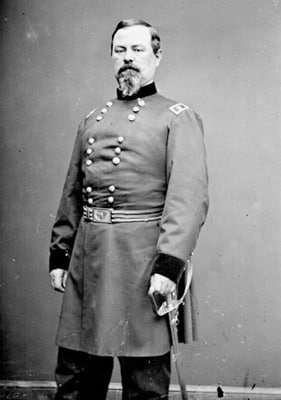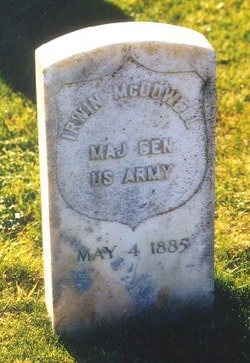Irvin McDowell was a career officer who is most remembered for his defeat at the First Battle of Bull Run. His defeat caused many to realize that the Union was in for a much longer fight than believed. McDowell went on to have other failures during the Civil War at the hands of his former friends who sided with the Confederacy. He would also be blamed for the loss of the Second Battle of Bull Run. He would serve as commander of the Department of the Pacific late in the war.

Early Life
Irvin McDowell was born in Columbus, Ohio, on October 15, 1818. He was the son of Abram Irvin McDowell and Eliza Seldon McDowell. He was the cousin to the Gettysburg hero, John Buford, and his brother, John Adair McDowell. Irvin came from a military tradition and was surrounded by many with the same aspirations as him. He attended college in France but graduated from the United States Military Academy in 1838, where he would be classmates with many of the future Confederate officers he would see on the battlefield. He was commissioned a second lieutenant and posted to the 1st U.S. Artillery. McDowell served as a tactics instructor at West Point before becoming aide-de-camp to General John E. Wool during the Mexican-American War. He was brevetted captain at Buena Vista and served in the Adjutant General's department after the war. While in that department, he was promoted to major on May 31, 1856.
Between 1848 and 1861, McDowell generally served as a staff officer to higher-ranking military leaders and developed experience in logistics and supply. He developed a close friendship with General Winfield Scott while serving on his staff. He also served under future Confederate General Joseph E. Johnston.
Civil War
On May 14, 1861, McDowell was promoted to brigadier general in the regular army and given command of the army of Northeast Virginia. Immediately, he felt the pressure from Washington to take the offensive against the Confederacy. Despite his protests of his men being ill-prepared and his experience being a supply officer rather than a field officer, he was forced into taking premature action against the South.
He failed to make adjustments to the experience of his men and created an ambitious plan that was too complex for his men to execute. This was the primary reason for the failure of the Union at the first Battle of Bull Run. His counterpart, Stonewall Jackson, understood the value of simple commands and easy-to-execute plans, which allowed his troops to move quickly and repel McDowell's much larger force.
After his failure at Bull Run, he was relieved of his command and replaced with General George McClellan. McDowell became a division commander in the Army of the Potomac. On March 14, 1862, President Lincoln issued an order forming the army into corps, and McDowell got command of the I Corps as well as a promotion to major general of volunteers. When the army set off for the Virginia Peninsula in April, McDowell's command was detached for duty in the Rappahannock area out of concern over Stonewall Jackson's activities in the Shenandoah Valley.
Eventually, the three independent commands of Generals McDowell, John C. Frémont, and Nathaniel P. Banks were combined into Major General John Pope's Army of Virginia, and McDowell led the III Corps of that army. Because of his actions at Cedar Mountain, McDowell was eventually brevetted major general in the regular army; however, he was blamed for the subsequent disaster at Second Bull Run. McDowell was also widely despised by his own troops, who believed him to be in cahoots with the enemy. He escaped culpability by testifying against Major General Fitz John Porter, whom Pope court-martialed for alleged insubordination in that battle. Pope and McDowell did not like each other, but McDowell tolerated serving under him with the full knowledge that he himself would remain a general after the war was over while Pope would revert to the rank of colonel. Despite his formal escape, McDowell received no new assignments for the next two years.
Postbellum Life

In July 1864, McDowell was given command of the Department of the Pacific. He later commanded the Department of California from July 27, 1865, to March 31, 1868, briefly commanded the Fourth Military Department, then commanded the Department of the East from July 16, 1868 – December 16, 1872. On November 25, 1872, he was promoted to major general. On December 16, 1872, McDowell succeeded General George G. Meade as commander of the Military Division of the South and remained until June 30, 1876. From July 1, 1876, he was commander of the Division of the Pacific. In 1882, Congress imposed a mandatory retirement age of 64 for military officers, and McDowell retired on October 14 of that year.
After the war, McDowell resided in San Francisco, California, and exercised his passion for landscaping. He served as Park Commissioner of San Francisco and was well thought of in California throughout the last years of his life. He served as Park Commissioner until his death from gastric cancer in 1885.
